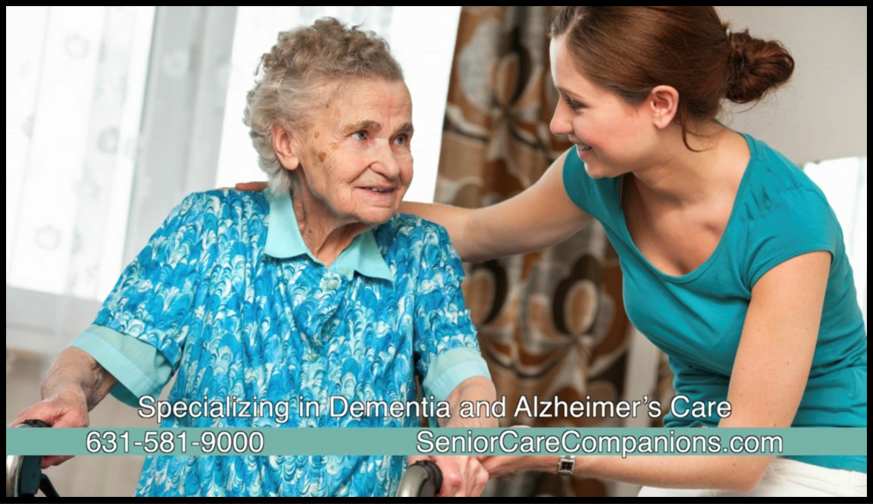
In this three-part blog series, I intend to provide some shocking facts regarding how pervasive Alzheimer’s and other forms of Dementia have become, as well as important and helpful tips for Alzheimer’s in-home care. In this first part, I’m going to lay out some of the facts and statistics regarding Alzheimer’s and provide a list of tips and tactics that will be helpful for both family caregivers and professional caregivers. In part two and three of this series I’m going to provide a more in-depth list of helpful tips and tactics focused on activities of daily living for Alzheimer’s in-home care.
Alzheimer’s is a type of dementia that causes problems with memory, thinking and behavior. Symptoms usually develop slowly and get worse over time, becoming severe enough to interfere with daily tasks.
- Many people believe Alzheimer’s is a mental disease, but it is in fact a physical disease. The brain is actually shrinking.
- The disease is the 6th-leading cause of death in the U.S. and it’s estimated that there are roughly 800,000 (15%) Americans with the disease who live alone.
- In 2019, Alzheimer’s and other dementias will cost the nation $290 billion and by 2050, these costs could easily rise to north of $1.1 trillion dollars.
- Between the year 2000 and 2017, deaths from heart disease have decreased 9% while deaths from Alzheimer’s disease have increased 145%.
- Every 65 seconds someone in the U.S develops the disease; it kills more people than breast cancer and prostate cancer COMBINED!
- Half of adults over the age of 85 have Alzheimer’s. Nearly two-thirds are women and 1 in 3 seniors die with Alzheimer’s or another form of dementia.
- 1 in 10 people over 65 (10%) has Alzheimer’s disease and more than half of the 5.4 million Americans with the disease may not know they have it.
- Up to 5% of Americans with Alzheimer’s (around 200,000) have the early-onset variety. These symptoms can start as early as age 30.
Family caregivers of Alzheimer’s patients provide a whopping 80% of the care at home, while only 10% of seniors receive in home care from agencies like SeniorCare Companions. Many current family caregivers are considered the sandwich generation because they’re not only taking care of their parents, but also their kids which is creating many problems. There is only so much time in one day. When someone with Alzheimer’s doesn’t have an identified caregiver, it puts those people in a situation which creates a much greater risk of medical emergencies, poor self-care, social isolation and a range of other issues. Quality of life is very important! Seniors over 80 years old are the fastest growing segment of the senior population. 90% of seniors say they prefer to age in place rather than leave their home, so it’s important to make people aware of companies like SeniorCare Companions. We have been providing in-home care for over 15 years and work closely with organizations like the ADRC (Alzheimer’s Disease Resource Center) and the Alzheimer’s Association which do an amazing job helping families deal with this major issue. Below are some helpful tips and tactics for in home care.
Love Them
People that have dementia tend to get anxious and nervous. Picture yourself in that situation, not knowing where you are, not feeling safe, and not being able to remember things. Treat them with dignity and respect and always remember that love is patient, love is kind and love is not easily provoked.
Know Them
The more you know about the person you’re caring for the better you’ll be able to help them out. Make an effort to learn about the people who brought joy to their lives and talk about those people. Find out what they did for a living and some of the things that interested them like their favorite books, movies, shows, plays, etc. Talk about these things with them and you will see how much of a difference it makes.
Develop a Daily Plan of Care
At SeniorCare Companions, we have a registered nurse come and assess your loved one to help develop a daily plan of care. A daily plan of care helps with creating a routine so things go more smoothly throughout the day. A daily routine is especially helpful for those dealing with general confusion. Try to plan bigger activities around the times of day when your loved one is less confused or more at ease.
Avoid Arguing
Don’t disagree with the person and don’t take anything they might say to you personally. Try to respond to the feelings they’re expressing and provide reassurance and comfort. Use a friendly tone, speak slowly, and explain things to them, but always assure them that they are safe and you’re there to help them. Hand under hand or hand over hand establishes a connection.
Offer Distractions
Suggest a change of topic or activity. Sometimes moving to another room or going outside for a walk may help.
Use Music
Studies have shown that music soothes and can help reduce problem behaviors, such as agitation and aggression (especially during mealtimes and bathing). However, it’s important to note that the music should be something that the person with dementia prefers, not necessarily what the caregiver thinks would be nice to listen to. Playing your loved one’s favorite types of music is typically the most effective form of dementia therapy.
Ensure Safety
Make sure the environment is free of objects that could be used to cause harm. Creating a safe environment is one of the most important aspects of care giving and can prevent many stressful and dangerous situations. Caregivers of people with dementia often must look at their homes through new eyes to identify and correct senior home safety risks. We will go into more depth about this in part two of this series.
I encourage anyone that needs assistance with Alzheimer’s in-home care to reach out to SeniorCare Companions at 631-581-9000 as well as the Alzheimer’s Disease Resource Center (ADRC) at 631-580-5100. Stay tuned for Part two of this three-part series.


